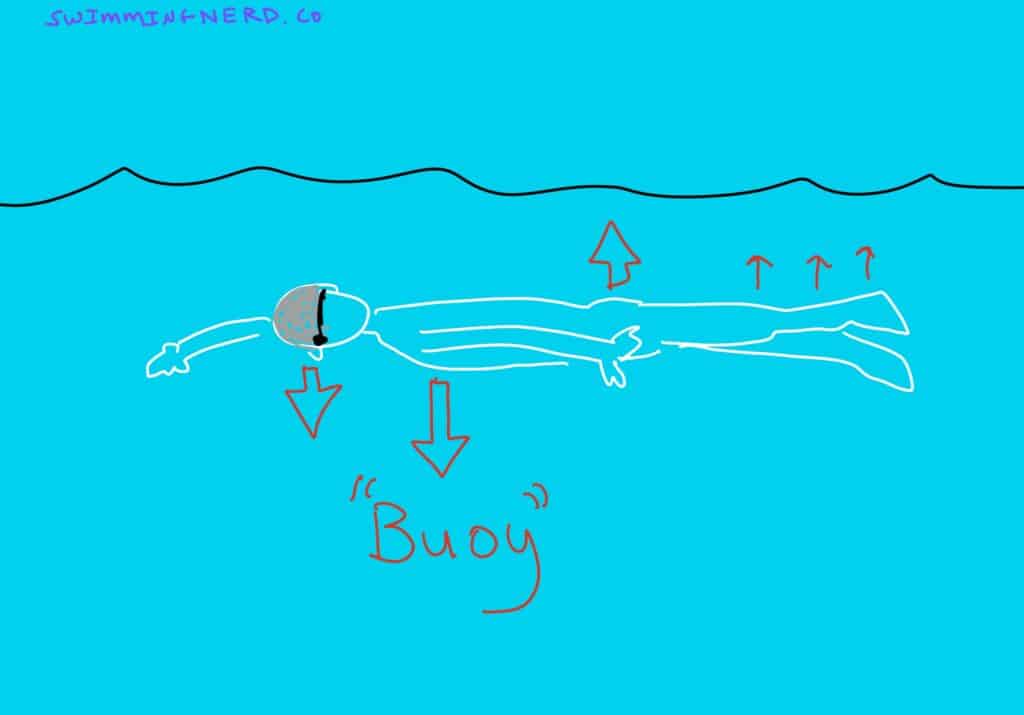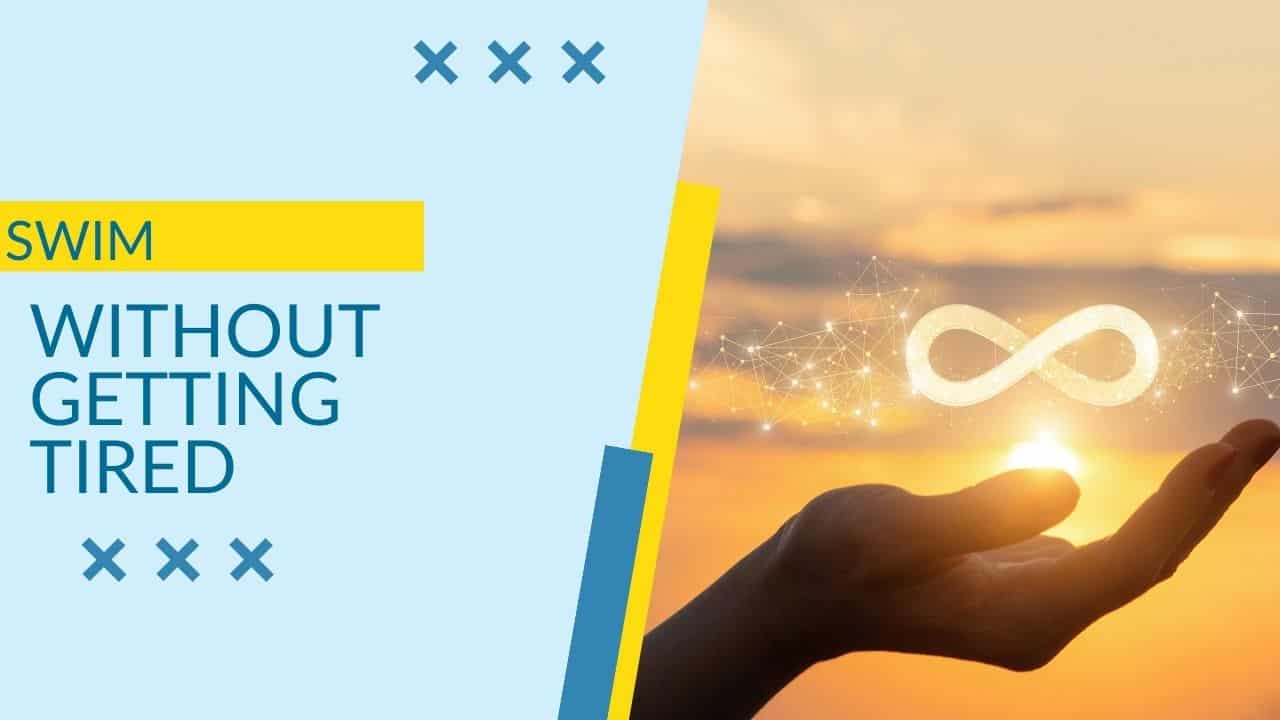Swimming is supposed to be the PERFECT workout
- Low-impact
- Improves heart health
- Is fun (well, sometimes)
But we’ve felt tired after a swim (or let’s be real, less than 5 minutes after we hop in the pool).
So let’s hit the question 👉 “How can I swim longer without getting tired?“
Swimming longer without getting tired comes down to improving technique, fitness & endurance building, and maintaining good swimming habits. Start by warming up and gradually increasing the distance of your swims to build endurance. Ensure you’re breathing correctly while swimming and stay hydrated before, during, and after your swim. Incorporating interval training, eating a healthy diet, and using proper equipment can also help. Additionally, improving your swimming technique to swim more efficiently will help you swim longer without getting tired.
This won’t happen overnight, but with a consistent approach, you can swim longer without getting tired.
As a long-time swimmer (since middle school!) 🏊♂️, I’d like to share my top tips for swimming longer (and easier), and getting back to actually ENJOYING your swim.
Table of Contents
- Why Do I Get Tired So Easily While Swimming?
- How to Increase Stamina for Swimming
- The Most Energy-Efficient Way to Swim
- Breathing Correctly While Swimming
- Key Takeaways:
- Swim Stamina F.A.Q.s
Why Do I Get Tired So Easily While Swimming?
Believe it or not, it’s not JUST that you’re “out of shape” or “bad at swimming.”
Fatigue while swimming is caused by several factors.
- Improper technique
- Lack of fitness and endurance
- Poor breathing
Swimming requires energy and if your technique is not efficient, you’ll tire quickly.
Improving technique and building fitness and endurance is key to swimming longer without fatigue.
Good technique helps you swim faster and more efficiently, using less energy and avoiding injury.
Regular cardio and strength training build your overall fitness and endurance, allowing you to swim longer.
How to Increase Stamina for Swimming
Building stamina for swimming requires a combination of regular exercise and good nutrition. Here are some tips to help you increase your stamina for swimming:
1 – Regular Cardio and Good Eating Habits
Incorporating regular cardio exercises into your routine, such as running, cycling, or rowing, WILL ABSOLUTELY help build your overall fitness and endurance.
This will prepare your body for the demands of swimming and help you swim for longer periods without getting tired.
Eating a well-balanced diet with plenty of fruits, vegetables, and lean protein can also help improve your stamina for swimming. These foods provide your body with the energy and nutrients it needs to perform at its best.
2 – Interval Training
Interval training is an effective way to build endurance for swimming.
FYI–“interval training” just means alternating between high-intensity and low-intensity swims, which can help you build both speed and endurance.
For example, you can swim a fast 50-meter sprint, followed by a slower 100-meter recovery swim. Repeat this pattern several times to build endurance and improve your stamina for swimming.
Keep your body guessing! 😎
3 – Gradually Increasing the Distance of Your Swims
GRADUALLY increasing the distance of your swims can help you build endurance and swim for longer periods without getting tired.
Again, nothing happens overnight.
Start with shorter distances and gradually increase the distance over time. This will help your body adapt to the demands of longer swims and build endurance. For example, if you’re currently swimming 1000 meters, aim to increase the distance by 100-200 meters each week.
This sounds obvious, but SO many people try to dive in (literally) to long swim sessions, truly before they’re ready.
Don’t feel shame in starting small, and working your way up!
4 – Get Energy for Your Swim!
Maintaining energy levels while swimming is essential for swimming longer without getting tired. Here are some tips to help you get the energy you need to swim:
- Hydration is Key: Make sure to drink plenty of water before, during, and after your swim. During a swim, it’s a good idea to drink water every 20-30 minutes to stay hydrated and prevent dehydration.
- Proper Nutrition: Eating a well-balanced diet with plenty of fruits, vegetables, and lean protein can provide your body with the energy and nutrients it needs to perform at its best. Additionally, consider eating a light snack, such as a banana or a granola bar, before your swim to provide you with the energy you need to swim for longer periods.
- Don’t eat JUST before your swim: It’s probably wise not to start a long swim on an empty stomach, but you also don’t want to eat a 4-course meal on your way to the pool! This causes your blood sugar to rise (and then possibly crash), draining your energy and making you feel bloated.
During your swim, drink water every 20-30 minutes, and after your swim, drink plenty of water to rehydrate.
Related: Should Swimmers Drink Soda?
The Most Energy-Efficient Way to Swim
Swimming efficiently is a huge part of swimming longer without getting tired.
Here are some tips to help you swim more efficiently:
Proper Stroke Technique
Proper stroke technique is essential for swimming efficiently. A good stroke will help you swim faster and use less energy, allowing you to swim for longer periods without getting tired.
I won’t go into the finer details here, but consider signing up for a swim class (or at the very least spend some time on YouTube) to improve your stroke technique.
The goal is to work smarter, not harder (getting more mileage out of each hydrodynamic stroke).
Wear the Right Equipment
Wearing the right equipment, such as a comfortable swimsuit and goggles, can also help you swim more efficiently. A comfortable swimsuit will reduce friction in the water, allowing you to swim faster and use less energy.
Goggles will help you see clearly in the water, improving your technique and probably contributing to your efficiency. And for the love of swim nerds everywhere, please don’t wear baggy swim trunks that look like a circus tent – they’re not hydrodynamic.
This isn’t family beach day 😉
Improving Body Position in the Water

(For more on this, see our post on Total Immersion swimming).
Improving your body position in the water can also help you swim more efficiently and swim for longer periods without getting tired.
Keep your body as streamlined as possible in the water, with your head down and your body in a horizontal position. Keep your legs relaxed and kick gently, using your legs for balance and stability rather than propulsion. By improving your body position in the water, you’ll swim more efficiently and conserve energy, allowing you to swim longer without getting tired.
Related: Open-Water Swimming Benefits!
Breathing Correctly While Swimming
Breathing correctly while swimming is ESSENTIAL for swimming endurance.
There are several breathing techniques used in swimming, including bilateral breathing, where you alternate breathing on each side, and pattern breathing, where you breathe on a specific side with each stroke.
Unless you’re a competitive swimmer optimizing for every single second–you should really be experimenting with different breathing techniques to find what works best for you.
Here are some tips to help improve your breathing while swimming:
- Practice controlled breathing. Inhale deeply and exhale slowly, taking a deep breath every three strokes or so.
- Exhale slowly and fully to maintain a steady pace and reduce fatigue.
- Focus on keeping your head down and neck relaxed while swimming, which will help you breathe more easily.
- Try swimming with a snorkel to practice breathing more efficiently.
- Incorporate breathing exercises, such as deep breathing or yoga, into your routine to improve your lung capacity and control.
Key Takeaways:
- Understand why you get tired while swimming (you’re out of shape and/or using bad technique)
- Building stamina through regular cardio and good eating habits
- Breathing correctly while swimming
- Getting energy for swimming through hydration and proper nutrition
- Swimming efficiently by using proper stroke technique and equipment
- Improving your breathing while swimming
So, dive into the pool, apply these tips and techniques, and swim longer without getting tired! With practice and dedication, you’ll be swimming like a pro in no time.
Swim Stamina F.A.Q.s
Why do I get tired so easily while swimming?
Swimming can be tiring because it is a full-body workout that requires endurance, strength, and technique. Improper technique and lack of fitness can also contribute to fatigue while swimming.
How do I increase my stamina for swimming?
To increase your stamina for swimming, focus on building your fitness through regular cardio exercise and maintaining good eating habits. Interval training can also help you build endurance. Gradually increase the distance of your swims to build your stamina.
How can I get energy for swimming?
To get energy for swimming, make sure to stay hydrated and eat a well-balanced diet with plenty of fruits, vegetables, and lean protein. Eat a light snack before your swim, and drink water every 20-30 minutes during your swim. After your swim, make sure to rehydrate with plenty of water.
What is the most energy efficient way to swim?
To swim efficiently and conserve energy, focus on using proper stroke technique, wearing the right equipment, and improving your body position in the water. Improving your swim technique can also help you swim more efficiently.
How do you breathe perfectly while swimming?
To breathe perfectly while swimming, practice controlled breathing, taking deep breaths every three strokes or so. Exhale slowly and fully to maintain a steady pace and reduce fatigue. Experiment with different breathing techniques to find what works best for you, and focus on keeping your head down and neck relaxed while swimming.

